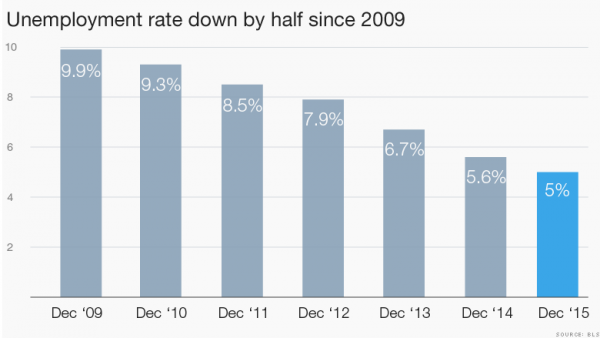
The U.S. economy added 178,000 jobs in November, and the unemployment rate fell to 4.6 percent from 4.9 percent the previous month, according to new government data released Friday morning. The first employment report since voters went to the polls last month shows an economy in strong shape as President-elect Donald Trump prepares to take office.
The unemployment rate fell to levels not seen since August 2007, before a bubble in the U.S. housing market began to burst. The fall was driven partly by the creation of new jobs and partly by people retiring and otherwise leaving the labor force.
“Overall, it’s a labor market that is continuing to improve, that has a decent momentum,” said Josh Feinman, chief global economist at Deutsche Asset Management. “So that’s certainly encouraging.”
Democrats seized on the report as evidence that President Obama had cultivated a much more robust economy that Trump would now inherit. The data comes a day after Trump celebrated a deal in Indiana to preserve about 1,000 jobs at a furnace factory run by Carrier, a unit of United Technologies, saying he planned to intervene more frequently in corporate decisions to move jobs overseas. Carrier had planned to move a factory to Mexico, but partially relented under pressure from Trump and a $7 million tax subsidy from the state.
Average hourly earnings declined by 3 cents to $25.89, paring back large gains in October. Still, over the year, average hourly earnings are up 2.5 percent, the Bureau of Labor Statistics said.
The report was largely in line with investor expectations, and stock markets were subdued in late-morning trading.
The data release comes ahead of the Federal Reserve’s Dec. 13-14 meeting, when the central bank is expected to announce its first interest rate increase in a year. Although wages fell slightly in November, many economists view the steady wage gains of the earlier months as a sign that a tightening labor market is allowing workers to demand higher pay, increasing pressure on the Fed to head off inflation by hiking interest rates.
Trump has promised to spend heavily to rebuild America’s infrastructure, plans that may also create jobs and increase inflationary pressure in coming months.
Trump surged to an electoral victory largely because of the support of white, working-class voters fearful of job losses, especially in blue-collar industries like manufacturing and mining. He has pledged to restore good-paying manufacturing jobs to the United States, a promise economists say will be difficult to achieve given the increasing role of automation in manufacturing.
While Trump boasted of the jobs saved in Indiana, the challenge going forward is the continued loss of manufacturing jobs, said Jed Kolko, chief economist at job search site Indeed. Construction, professional and business services, and healthcare were among the strongest-performing sectors of the economy in November, but manufacturing industry jobs declined compared with the previous month and one year ago.
“To bring back manufacturing jobs means overcoming some pretty strong headwinds,” said Kolko.
The November jobs report was also one of the final snapshots of the economy under President Obama’s administration.
While some economists note that America’s labor force participation rate remains low and broader measures of unemployment are still elevated, the data captured an economy that has bounced back from Obama’s first months in the White House, when the private sector was shedding roughly 800,000 jobs a month and the unemployment rate was at 10 percent.
Christopher P. Lu, the deputy secretary of the Labor Department, said 15.6 million private sector jobs have been created during Obama’s term in office, the longest run of job creation in history. “It is hard to imagine a more stark contrast between the economy that we are passing off to our successor and the economy we inherited.”
WASHINGTON POST

Leave a Reply
You must be logged in to post a comment.